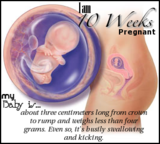My Body This Coming Week at 11 weeks
Many women who have suffered from morning sickness find that their nausea begins decrease from this week on. (Unfortunately, for some it may continue).
You may have noticed you have more (or less) hair than usual, which is thought to be linked to the increased amount of blood circulating through your body as well as hormonal changes.
You are probably anxious to feel your baby move, but it is still a bit early. You may notice an increase in cervical fluid and you may also notice a darkening of your labia around your vagina and the areola area around your breasts due to hormonal changes.
During pregnancy, the cervix usually feels firm, but it will soften during labor to allow the baby to pass through. Your cervix is protected by a mucus plug to protect your baby. The mucus plug will be expelled shortly before or during labor.
Your body is burning calories faster than it did prior to pregnancy and your metabolism may increase by up to 25%. The quantity of blood pumping through your body will also increase, making you feel warmer than usual. The increased blood flow can also give you a rosy "blooming" feeling.
You may notice that you have an improved skin condition during pregnancy. For some lucky women, pregnancy hormones can cause skin to appear to "glow" and appear smoother. You may even have shinier hair and brighter eyes. Some women develop a "pregnancy mask" (chloasma) caused by deeper skin pigmentation. This can cause irregular patches of brown skin to appear on your forehead, cheeks, neck and nose. Exposure to sunlight can exacerbate chloasma, though sunscreen can reduce its effects. Chloasma usually disappears after birth as your hormones return to their pre-pregnancy levels.
Elevated estrogen levels and increased blood pressure can cause the dilation of your skin capillaries which can in turn give rise to spider nevi (raised red marks surrounded by spidery lines) and palmar erythema (redness of the palms) during pregnancy. Both conditions are considered minor and fade after the birth of your baby.


No comments:
Post a Comment